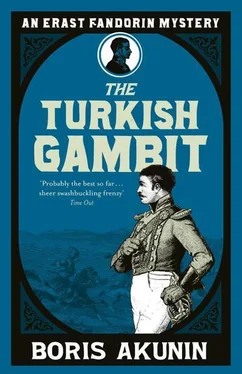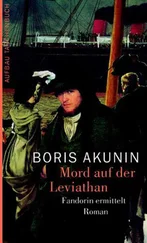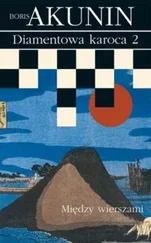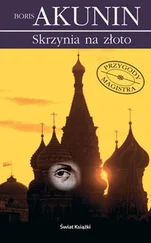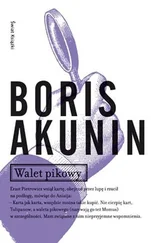'Monsieur Perepyolkin was kind enough to explain to me the best way of approaching the town without attracting a bullet,' Paladin explained to the adoring listeners surrounding him. 'And it was really not difficult at all - the Turks had not even bothered to arrange proper patrols and I only met my first asker on the outskirts of the town. "What are you gawping at?" I yelled at him. "Take me to your senior commander immediately." In the East, gentlemen, the most important thing is to act like a padishah. If you shout and swear, then perhaps you may actually have a right to do it. They brought me to the colonel. His name is Ali-bei - a red fez, a big black beard and a St Cyr badge on his chest. Excellent, I thought, la belle France will come to my rescue. I put my situation to him. From the Parisian press. Abandoned by the malevolent fates in the Russian camp, where the boredom is absolutely intolerable and there are no exotic distractions at all, nothing but drunkenness. Would the honourable Ali-bei not agree to give an interview for the public of Paris? He would. So we sit there, drinking cold sherbet. My friend Ali-bei asks me: "Is that wonderful cafe on the corner of the Boulevard Raspaille and the Rue de Sevres still there?" To be quite honest, I don't have a clue whether it is or it isn't, it is such a long time since I was last in Paris, but I say: "Why of course, and more prosperous than ever." We speak about the boulevards, the can-can, the cocottes. The colonel becomes quite sentimental, his beard even becomes quite straggly - and it is a most distinguished beard, quite the Marechal de Rey - and he sighs: "Yes, the moment this cursed war is over, I shall go to Paris, to Paris." "Will it be over soon then, effendi?" "Soon," says Ali-bei. "Very soon. Once the Russians dislodge me and my wretched three tabors from Plevna, you can write your conclusion. The road will be left open all the way to Sophia." "Aye-aye-aye," I lament. "You are a very brave man, Ali-bei, to face the entire Russian army with only three battalions! I shall certainly write to my newspaper about this. But where is the glorious Osman Nuri-pasha and his army corps?" The colonel took off his fez and waved one hand in the air: "He promised to be here tomorrow, but he will not be in time - the roads are too bad. The evening of the next day, no sooner." All in all, we had a splendid little chat. We talked about Constantinople and Alexandria. It cost me quite a struggle to get away - the colonel had already ordered a ram to be slaughtered. On Monsieur Perepyolkin's advice I have acquainted the grand duke's staff with the contents of my interview. They found my conversation with Ali-bei quite interesting,' the correspondent concluded modestly. 'I believe that tomorrow the Turkish colonel is due for a little surprise.'
'Oh, Paladin, you old hot-head you!' cried Sobolev, advancing on the Frenchman to clutch him in a general's embrace. 'A genuine Gaul! Let me kiss you!'
Paladin's face disappeared behind the general's immense beard and McLaughlin, who was playing chess with Perepyolkin (the captain had already removed his black bandage and was contemplating the board with both eyes screwed up in concentration), remarked dryly: 'The captain ought not to have used you as a scout. I am not really certain, my dear Charles, that your escapade is entirely beyond reproach from the viewpoint of journalistic ethics. A correspondent from a neutral country has no right to take either side in a conflict, and especially to take on the role of a spy, insofar—'
But at this everyone, including Varya, fell upon the tiresome Celt in such a concerted attack that he was forced into silence.
'Oho, here's real revelry!' a confident, ringing voice declared.
Varya swung round to see a handsome officer of the hussars with black hair, a jaunty moustache, slightly slanting eyes with a devil-may-care glint and a shiny new Order of St George on his pelisse. This new arrival was not in the least embarrassed by the universal attention that he had attracted - on the contrary, he seemed to accept it as something entirely natural and undeserving of comment.
'Captain of the Grodno Hussars Regiment, Count Zurov,' the officer announced with a salute to Sobolev. 'Do you not remember me, Your Excellency? We marched on Kokand together and I served on Konstantin Petrovich's staff.'
'Of course I remember you,' said the general with a nod. 'As I recall, you were tried for gambling while on the march and fighting a duel with some quartermaster or other.'
'By God's mercy nothing came of it,' the hussar replied flippantly. 'They told me my old friend Erasmus Fandorin is sometimes to be found in here. I trust they were not lying?'
Varya glanced quickly at Erast Petrovich, seated in the far corner. He stood up, gave an agonised sigh and said in a faint voice: 'Hippolyte? How do you c-come to be here?'
'There he is, damn me if he isn't!' The hussar dashed at Fandorin and began shaking him by the shoulders so enthusiastically that he set Erast Petrovich's head wobbling backwards and forwards.
'And they told me the Turks had set you on a stake in Serbia! Ah, but you've lost your looks, brother,-I hardly knew you. Touch up the temples to make yourself a bit more impressive - is that it?'
My, but this titular counsellor certainly did have a curious circle of acquaintances: the Vidin pasha, the chief of gendarmes, and now this picture-postcard dandy with the swashbuckling manners. Varya crept a little closer, as if by chance, in order not to miss a single word.
'Life has certainly put us through the mill a bit, that it has.' Zurov stopped shaking his old friend and began slapping him on the back instead. 'But I'll tell you about my adventures some other time, tete-a-tete -they're not for a lady's ears.' He gave Varya a mischievous sideways glance. 'But anyway, they had the usual ending: I was left without a kopeck to my name, all on my lonely ownsome with my heart shattered to tiny little pieces' (another glance in Varya's direction).
'Who c-could ever have imagined it?' commented Fandorin.
'Are you stammering? Concussion? Don't worry about it, it'll pass. Near Kokand a blast wave flung me against the corner of a mosque so hard my teeth were chattering for an entire month, would you believe - I couldn't even get a glass anywhere near my mouth. But after that it was all right, it eased off.'
'And where did you c-come from before here?'
'That, brother Erasmus, is a long story.'
The hussar ran an eye over the club's habitues, who were observing him with undisguised curiosity, and said: 'Don't be shy, gentlemen; come closer. I'm relating my Scheherazade to my friend Erasmus here.'
'Odyssey,' Erast Petrovich corrected him in a low voice, retreating behind the back of Colonel Lukan.
'An Odyssey is what happens in Greece, but what happened to me was a genuine Scheherazade.' Zurov paused to whet his listeners' appetites and then launched into his narrative. 'And so, gentlemen, as a result of certain circumstances known only to myself and Fandorin here, I found myself in Naples, totally washed up, high and dry. I borrowed five hundred roubles from the Russian consul - the old skinflint wouldn't give me any more - and set out for Odessa by sea. But along the way the devil prompted me to set up a little game with the captain and the navigator. The scoundrels cleaned me out completely, right down to the very last kopeck. Naturally I protested vigorously and, having caused some minor damage to ship's property in the process, at Constantinople I was thrown off the ship, I mean to say I was put ashore - without any money or any possessions, not even a hat. And it was winter then, gentlemen. A Turkish winter, but even so it was cold. There was nothing else to be done, so I set out for our embassy. Broke through all the barriers, went all the way up to the ambassador himself, Nikolai Pavlovich Gnatiev. A most understanding kind of fellow. "I can't lend you any money," he says, "on account of my being opposed in principle to lending of any kind; but if you like, Count, I can take you on as my adjutant - I'm in need of a few valiant officers. In that case you will receive the usual start-up expenses and so on and so forth." And so I became an adjutant.'
Читать дальше
